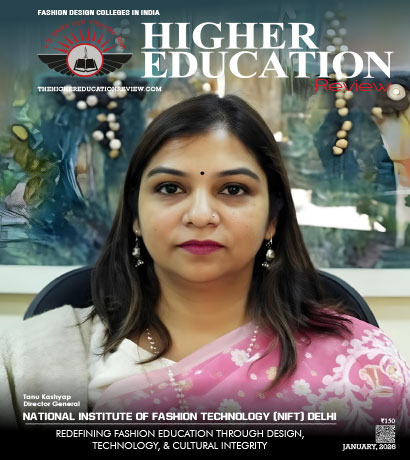The Right Way to Educate the Next-Gen

Raghav Podar, Chairman Podar Education Group
The Higher Education system in India is largely outdated with serious need of disruption and innovation. India was once considered the jewel in the crown and the research hub of the world. In 2016-17, it is embarrassing to note that one American company (Qualcomm) filed 1,840 patents in India, whereas all the IIT's put together submitted only 400 applications. The current system does not serve the value and needs of the 21st-century skills our students will require to compete globally. We pigeonhole students into fixed streams with very little flexibility, many a time which the student has no aptitude for. Due to this, the system builds more pressure on the poor student, many of whom cannot take it, and resort to drastic steps.
In an age of the 4th Industrial revolution with infinite amounts of information available through Google at everyone's fingertips, the ability to memorize is no longer a value-added skill
Winning and losing are two sides of the same coin. Of course, everyone wants their coin to fall on the winning side always; but there are going to be numerous times that don't happen. That's life! What is important though is not the winning or the losing, but how we deal with it. We can get dejected and go into a shell thinking we're no good that we lost, or we can realize that failure is the greatest teacher and it can teach you far more than success ever can. What then do we, as an education system, do to our students when they don't perform well, or even fail in exams? The bitter truth is that we castigate them and make them feel even worse. By setting up university exams as the be-all end-all of their young lives, society has only set most of them up for failure, who don't excel in such high-pressure situations. Our students weren't meant to be cooked in pressure cookers, so let's start by celebrating what they're good at!
Identify the Uniqueness
Each student is unique and has an inherent potential. For some that might be acing an exam, which in our country is not much more than a measure of their memory retention capacity, but for most others, it is something else. Why then are we, in 2018, still trying to cookie-cut students, into molds of our pre-conceived notions of what makes the "Good Indian child"?
In an age of the 4th Industrial revolution with infinite amounts of information available through Google at everyone's fingertips, the ability to memorize is no longer a value-added skill. The world economy in the 21st century is not going to reward you for what you know, but for what you can do with what you know; not for the amount of knowledge that you have, but for how you apply the knowledge that you have! The students need to experiment, test their hypotheses, readjust and validate, and they need to be rewarded for these processes rather than be made to look foolish for thinking out of the box and not following the current one right answer policy. How will we get students to develop and innovate if we continue to put a lid on their imagination and creativity?
Most of the biggest successes in life today, have encountered failure at every step in their struggle. The key is grit, persistence, and perseverance. Some of the most successful people in the world have gone through repeated failure and rejection at every step they took. Yet they persisted, showed grit, brushed themselves off, got their chin up and tried again, with even more enthusiasm. Years earlier, when a global fast-food chain store opened in China, they invited applications for servers, whose job was only to put burgers and a cold drink on a tray and ask "would you like fries with that?" Of the 28 applicants, 27 got selected, 1 got rejected. Today, that 1 rejected candidate is Jack Ma, the founder of Alibaba, and is worth $46.7 Billion!
Stop making failure a bad word!
The average undergrad in the U.S. changes their major at least once during their 4-year course, many changes it 2 to 3 times. Stop fretting if your child is confused about what they want to do. At 18, did you know what you wanted to do? And how many times has that changed till now? It's absolutely normal for students to be figuring out their paths, or be confused about what they want to do or become and changing their minds many times.
Children are raw uncut diamonds. They need good jewelers to allow them to shine at their brightest. It is the education system that needs the recalibration, not the students. The sufferer may end up being the student, but the failure is that of the antiquated education system!
Raghav Podar
Shouldering a 90-year-old legacy, Raghav Podar is at the steering wheel of India's highly acclaimed Podar Education Group. As Chairman of Podar World School, he is a path-breaking educationist and a thought leader on constructing optimal learning environments. He has completed his education from The University of Texas, Austin and the University of Warwick.
In an age of the 4th Industrial revolution with infinite amounts of information available through Google at everyone's fingertips, the ability to memorize is no longer a value-added skill
Winning and losing are two sides of the same coin. Of course, everyone wants their coin to fall on the winning side always; but there are going to be numerous times that don't happen. That's life! What is important though is not the winning or the losing, but how we deal with it. We can get dejected and go into a shell thinking we're no good that we lost, or we can realize that failure is the greatest teacher and it can teach you far more than success ever can. What then do we, as an education system, do to our students when they don't perform well, or even fail in exams? The bitter truth is that we castigate them and make them feel even worse. By setting up university exams as the be-all end-all of their young lives, society has only set most of them up for failure, who don't excel in such high-pressure situations. Our students weren't meant to be cooked in pressure cookers, so let's start by celebrating what they're good at!
Identify the Uniqueness
Each student is unique and has an inherent potential. For some that might be acing an exam, which in our country is not much more than a measure of their memory retention capacity, but for most others, it is something else. Why then are we, in 2018, still trying to cookie-cut students, into molds of our pre-conceived notions of what makes the "Good Indian child"?
In an age of the 4th Industrial revolution with infinite amounts of information available through Google at everyone's fingertips, the ability to memorize is no longer a value-added skill. The world economy in the 21st century is not going to reward you for what you know, but for what you can do with what you know; not for the amount of knowledge that you have, but for how you apply the knowledge that you have! The students need to experiment, test their hypotheses, readjust and validate, and they need to be rewarded for these processes rather than be made to look foolish for thinking out of the box and not following the current one right answer policy. How will we get students to develop and innovate if we continue to put a lid on their imagination and creativity?
Most of the biggest successes in life today, have encountered failure at every step in their struggle. The key is grit, persistence, and perseverance. Some of the most successful people in the world have gone through repeated failure and rejection at every step they took. Yet they persisted, showed grit, brushed themselves off, got their chin up and tried again, with even more enthusiasm. Years earlier, when a global fast-food chain store opened in China, they invited applications for servers, whose job was only to put burgers and a cold drink on a tray and ask "would you like fries with that?" Of the 28 applicants, 27 got selected, 1 got rejected. Today, that 1 rejected candidate is Jack Ma, the founder of Alibaba, and is worth $46.7 Billion!
Stop making failure a bad word!
The average undergrad in the U.S. changes their major at least once during their 4-year course, many changes it 2 to 3 times. Stop fretting if your child is confused about what they want to do. At 18, did you know what you wanted to do? And how many times has that changed till now? It's absolutely normal for students to be figuring out their paths, or be confused about what they want to do or become and changing their minds many times.
Children are raw uncut diamonds. They need good jewelers to allow them to shine at their brightest. It is the education system that needs the recalibration, not the students. The sufferer may end up being the student, but the failure is that of the antiquated education system!
Raghav Podar
Shouldering a 90-year-old legacy, Raghav Podar is at the steering wheel of India's highly acclaimed Podar Education Group. As Chairman of Podar World School, he is a path-breaking educationist and a thought leader on constructing optimal learning environments. He has completed his education from The University of Texas, Austin and the University of Warwick.

